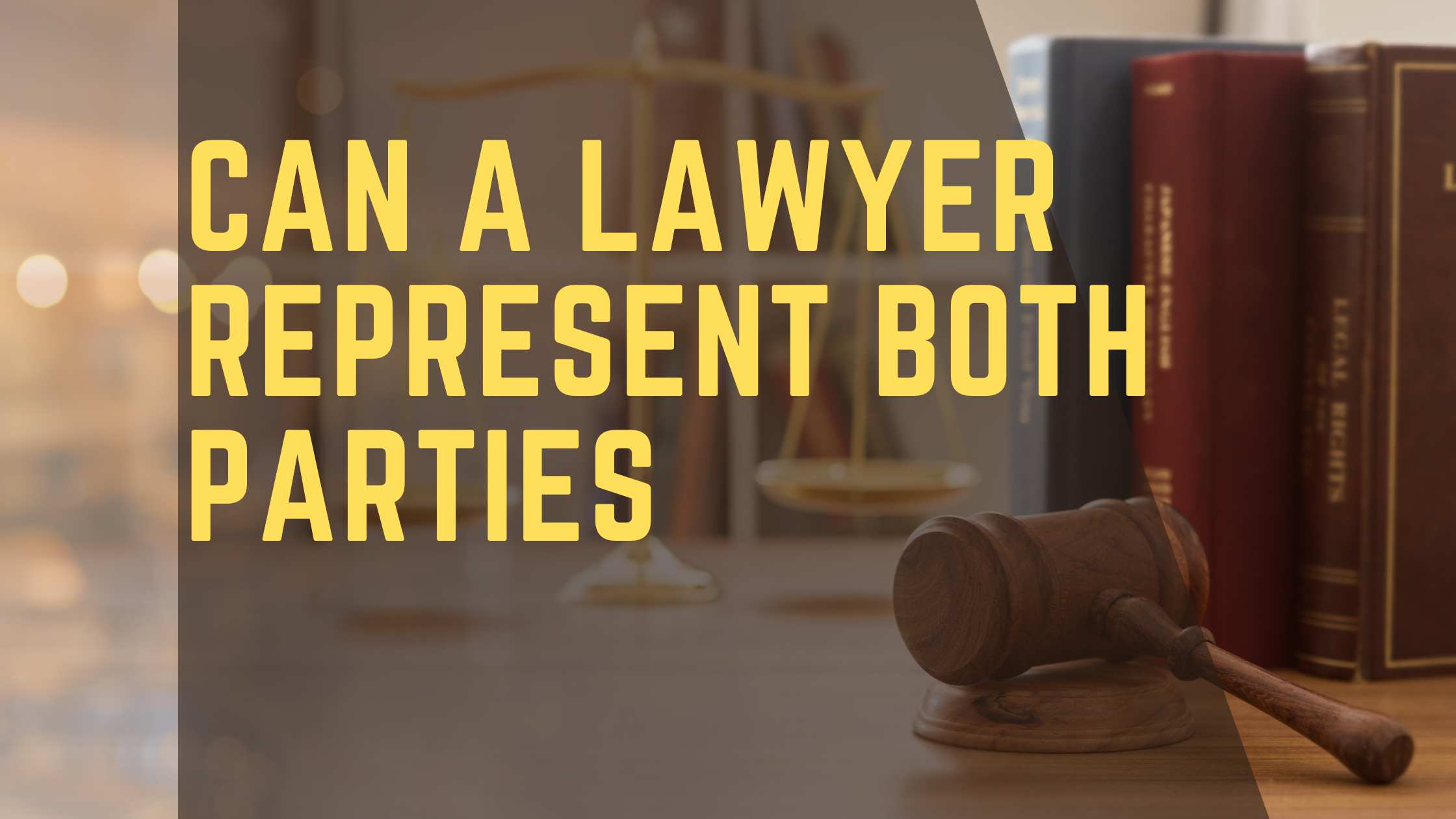Can a Lawyer Represent Both Parties?

No, a lawyer cannot represent both parties involved in a legal matter.
The Role Of A Lawyer
The role of a lawyer goes beyond just representing their clients in legal proceedings. They have a vital responsibility to advocate for their clients and provide them with legal advice to guide them through the complexities of the legal system.
Advocating For Clients
When it comes to legal matters, a lawyer acts as the voice and advocate for their clients. They ensure their clients’ interests are protected and fight for their rights in the court of law. Whether it’s negotiating settlements or presenting arguments in front of a judge and jury, a lawyer is there to passionately assert their clients’ positions.
Advocacy often involves researching and analyzing relevant laws and cases, preparing legal documents, and presenting persuasive arguments. Lawyers use their knowledge, experience, and skills to build strong cases and represent their clients effectively.
Offering Legal Advice
As legal experts, lawyers play a crucial role in providing sound legal advice to their clients. They interpret and explain the law in simple terms, helping individuals navigate through legal complexities.
Lawyers provide guidance on various legal issues, such as contracts, estate planning, criminal defense, and business matters. They inform their clients about their rights and obligations, potential risks, and potential outcomes. By offering clear and comprehensive legal advice, lawyers help their clients make informed decisions that align with their best interests.
Beyond advising their clients, lawyers also assist in drafting legal documents and contracts, ensuring they comply with applicable laws and protect their clients’ rights.
In conclusion, a lawyer’s role extends beyond simply representing their clients. They are dedicated advocates who fight for their clients’ interests and provide them with valuable legal advice. Whether it’s in the courtroom or in the conference room, lawyers play a crucial role in ensuring the fair and just resolution of legal matters.
Conflicts Of Interest
In the legal field, conflicts of interest can arise when a lawyer represents more than one party in a case. Understanding the definition, examples, and ethical considerations in these situations is crucial for maintaining the integrity of legal representation.
Definition And Examples
Conflicts of interest occur when a lawyer‘s representation of one client is adverse to the interests of another client, or when there is a significant risk that the lawyer’s ability to consider, recommend, or carry out an appropriate course of action for one client will be materially and adversely affected by the lawyer’s responsibilities to another client.
For example:
- A lawyer representing a divorced couple in a property dispute may face conflicts of interest if they have previously advised one spouse on financial matters.
- Representing both the buyer and seller in a real estate transaction can lead to conflicts of interest if the lawyer cannot remain fully loyal to both parties’ best interests.
Ethical Considerations
Lawyers have a duty to act in the best interests of their clients and avoid conflicts of interest that could compromise their ability to provide zealous and competent representation. They must disclose any potential conflicts of interest to their clients and obtain their informed consent before proceeding with dual representation.
The Duty Of Loyalty
When it comes to legal representation, the duty of loyalty is a fundamental principle that attorneys must uphold. The duty of loyalty requires lawyers to put their client’s interests first and maintain a strict level of confidentiality. However, the question arises: Can a lawyer represent both parties involved in a legal matter, while still adhering to the duty of loyalty?
Putting Clients’ Interests First
Lawyers have a fiduciary duty to their clients, meaning they must act in the best interests of their clients at all times. This duty requires attorneys to diligently represent their clients, advocate for their rights, and make decisions that benefit their clients’ legal position. When a lawyer represents both parties in a legal matter, it becomes challenging to prioritize one client’s interests over the other.
Representing both sides may create conflicts of interest that compromise the lawyer’s ability to provide unbiased and undivided loyalty to each client. Attorneys must make judgment calls that could potentially disadvantage one client over the other, even inadvertently. This raises ethical concerns and undermines the fundamental duty of loyalty that lawyers owe their clients.
Maintaining Confidentiality
An essential aspect of the attorney-client relationship is the preservation of confidentiality. Clients must be able to openly discuss their legal matters with their lawyers, knowing that the information shared will remain confidential. This allows clients to disclose all relevant facts and information without fearing its disclosure to opposing parties.
When a lawyer represents both sides of a legal dispute, maintaining confidentiality becomes increasingly challenging. The lawyer may inadvertently gain access to confidential information from one client that could potentially benefit the opposing party. This breach of confidentiality erodes the trust between the lawyer and client, compromising the attorney-client privilege and the duty of loyalty.
Furthermore, the knowledge gained through representing both parties might put the lawyer in a situation where they feel compelled to disclose information that could be harmful to one client’s case. This dilemma directly conflicts with the lawyer’s duty to maintain client confidences, ultimately undermining the duty of loyalty.
In conclusion, the duty of loyalty is a cornerstone of the legal profession, requiring lawyers to prioritize their clients’ interests and maintain strict confidentiality. Representing both parties in a legal matter poses significant challenges to upholding this duty. Therefore, it is generally considered unethical for a lawyer to represent both parties, as it compromises their ability to provide undivided loyalty and maintain the necessary level of confidentiality.
Dual Representation
Dual representation, also known as representing both parties, occurs when a lawyer represents two or more parties with potentially conflicting interests in the same legal matter. This approach raises important ethical questions and considerations surrounding the attorney-client relationship. It’s crucial to understand when dual representation is permitted and when it is prohibited to navigate the complexities of legal representation effectively.
When It Is Permitted
There are instances when lawyers may represent both parties involved in a legal matter without compromising their ethical obligations. Here are a few scenarios where dual representation is permitted:
1. Uncontested Matters:
In situations where there is no conflict of interest between the parties, such as in uncontested divorces or straightforward business transactions, lawyers can often represent both parties. However, this is only possible when there is mutual agreement and consent from all parties involved.
2. Limited Scope Representation:
In certain situations, lawyers may provide limited scope representation to both parties. This means they only represent the clients in specific aspects of the case, while other matters are handled separately. This can help minimize potential conflicts and maintain objectivity.
3. Informed Consent:
Legal representation is possible when all parties involved provide informed consent, fully understanding the potential risks and benefits of dual representation. Lawyers have a duty to ensure their clients are aware of any potential conflicts of interest and ensure both parties voluntarily agree to the arrangement.
When It Is Prohibited
While there are circumstances where dual representation is permitted, there are also situations where it is strictly prohibited due to conflicting interests. Here are a few scenarios where lawyers cannot represent both parties:
1. Conflicting Interests:
If the interests of the two parties conflict with each other, lawyers are ethically obligated to refrain from representing both clients. This is to prevent any compromise on the lawyer’s duty of loyalty and the potential detriment to each party’s legal positions.
2. Adversarial Proceedings:
In adversarial proceedings, such as criminal cases or civil disputes where the parties are in opposition to each other, lawyers cannot reasonably or ethically represent both sides. The duty to zealously advocate for their client’s interests in such cases precludes dual representation.
Understanding the circumstances when lawyers can or cannot represent both parties is instrumental in ensuring ethical practice and upholding the interests and rights of all parties involved. By considering these factors, lawyers can make informed decisions that prioritize professionalism, diligence, and the integrity of the legal process.
Potential Risks And Concerns
When it comes to legal representation in a conflict, it’s crucial to consider the potential risks and concerns associated with a lawyer representing both parties. The ethical and legal implications of such representation can lead to various challenges that may impact the fairness and integrity of the legal process.
Unequal Representation
If a lawyer represents both parties in a legal matter, there is a risk of unequal representation. This could occur if the lawyer’s loyalty and advocacy become lopsided, favoring one party over the other. Clients may feel that their interests are not adequately protected, leading to distrust in the legal system and potential disputes over the fairness of the representation.
Informed Consent
Informed consent is a critical aspect of legal representation. When a lawyer represents both parties, obtaining informed consent from each party becomes crucial. This involves ensuring that clients understand the potential conflicts of interest and the implications of shared representation. Without proper informed consent, the legal process may face challenges related to ethical standards and client trust.

Credit: doyledivorcelaw.com
Conclusion
The decision to have a lawyer represent both parties in a legal matter can be complex. It’s crucial to assess the potential conflicts of interest and ensure that all parties involved fully understand the implications before proceeding. Each case is unique and requires careful consideration to avoid any ethical or legal issues that may arise.
Amelia Justiceberg, a distinguished legal luminary, thrives on the intersection of empathy and legal acumen. As a prominent family law attorney, she orchestrates compassionate resolutions amidst complex dynamics. Justiceberg's courtroom finesse and dedication to fairness define her practice. Beyond litigation, she ardently advocates for social justice, solidifying her reputation as an influential force in the legal landscape.






